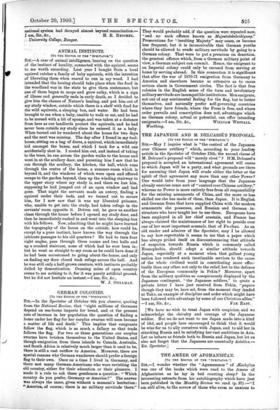THE JAPANESE AND M. DELCASSE'S PROPOSAL.
[TO THE EDITOR OF THE "SPECTAT0R:] Sin,—May I inquire what is "the control of the Japanese over Chinese artillery" which, according to your leading article in the Spectator of October 13th, the second clause of M. Delcasse's proposal will" merely rivet " ? If M. Delcastas proposal is accepted, an international agreement will ensue to which Japan will be a party, and what grounds are there for assuming that Japan will evade either the letter or the spirit of that agreement any more than any other Power? One would infer from your language that the Japanese already exercise some sort of "control over Chinese artillery," whereas no Power is more entirely free from all responsibility for the existing armaments of China, and the more or less skilled use she has made of them, than Japan. It is English and German firms that have supplied China with the modern armaments she possesses, and Russian and German - in- structors who have taught her to use them. Europeans have been employed in all her chief arsenals, and France has always claimed the maintenance of her right to preside over one of her most important arsenals, that of Fu-chau. As an old reader and admirer of the Spectator, may I be allowed to say how regrettable it seems to me that a paper which has always prided itself on discountenancing that attitude of suspicion towards Russia which is commonly called Russophobia, should adopt a similar attitude towards Japan, especially at a moment when that gallant young nation has rendered such inestimable services to the cause of the whole civilised world in contributing more effec- tually than any other, not only to the relief, but to the defence of the European community in Pekin ? Moreover, apart from the military qualities so conspicuously displayed by the Japanese contingent, "the Japanese soldiers," to quote a private letter I have just received from Pekin, "pagans though they may be, have set, from the moment they landed at Taku, an example of discipline and order which might have been followed with advantage by some of our Christian allies."
[We have no wish to treat Japan with suspicion, and we acknowledge the chivalry and courage of the Japanese soldier. But we do not want to see Japan made into a kind of idol, and people here encouraged to think that it would be wise for us to ally ourselves with Japan, and to aid her in attacking Russia and in satisfying her vast ambitions in Asia. Let us behave as friends both to Russia and Japan, but let us also not forget that the Japanese are essentially Asiatics.— E n. Spectator.]






































 Previous page
Previous page